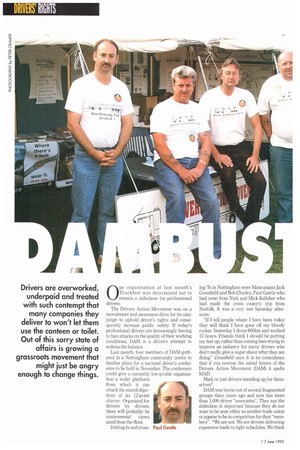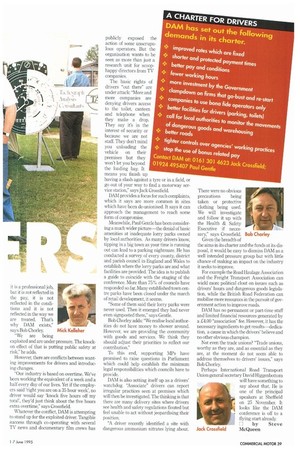O ne organisation at last month's Truckfest was determined not to remain a sideshow for professional drivers.
Page 50

Page 51

If you've noticed an error in this article please click here to report it so we can fix it.
The Drivers Action Movement was on a recruitment and awareness drive for its campaign to uphold driver's rights and consequently increase public safety. If today's professional drivers are increasingly having to face attacks on the quality of their working conditions, DAM is a driver's attempt to redress the balance.
Last month, four members of DAM gathered in a Nottingham community centre to finalise plans for a national driver's conference to be held in November. The conference could give a currently low-profile organisation a wider platform from which it can attack the stated objectives of its 12-point charter. Organised for drivers by drivers, there will probably be controversial views aired from the floor.
Dotting Is and crossPaul Gentle
ing Ts in Nottingham were Mancunians Jack Crossfield and Bob Chorley, Paul Gentle who had come from York and Mick Kelleher who had made the cross country trip from Norfolk. It was a very wet Saturday afternoon: "If I tell people where I have been today they will think I have gone off my bloody rocker. Yesterday I drove 800km and worked 15 hours. Friends think I should be putting my feet up, rather than coming here trying to improve an industry for many drivers who don't really give a sugar about what they are doing." Cro,ssfield says it is no coincidence that if you reverse the initial letters of the Drivers Action Movement (DAM) it spells MAD.
Mad, or just drivers standing up for themselves?
DAM was borne out of several fragmented groups three years ago and now has more than 1,000 driver "associates". They say the definition is important because they do not want to be seen either as another trade union or appear to be in competition for their "members". "We are not We are drivers delivering expensive loads to tight schedules. We think it is a professional job, but it is not reflected in the pay, it is not reflected in the conditions and it is not reflected in the way we are treated. That's why DAM exists," says Bob Chorley.
"We are being exploited and are under pressure. The knockon effect of that is putting public safety at risk," he adds.
However, there are conflicts between wanting improvements for drivers and introducing changes.
"Our industry is based on overtime. We've been working the equivalent of a week and a half every day of our lives. Yet if the employers said 'right you are on a 35 hour week', no driver would say 'knock five hours off my total', they'd just think about the five hours extra overtime," says Crossfield.
Whatever the conflict, DAM is attempting to stand up for the exploited driver. Tangible success through co-operating with several TV news and documentary film crews has
publicly exposed action of some unscru bus operators. But organisation wants to seen as more than jus research unit for scoc happy directors from 1 companies.
The basic rights drivers "out there" at under attack: "More an more companies ar denying drivers acces to the toilet, canteer and telephone when they make a drop. They say it's in the interest of security or because we are not staff. They don't mind you unloading the vehicle on their premises but they won't let you beyond the loading bay. It means you finish up having a slash against a tyre or in a field, or go out of your way to find a motorway service station," says Jack Crossfield.
DAM provides a focus for such complaints, which it says are more common in sites which have been de-unionised. It says it can approach the management to reach some form of compromise.
Meanwhile, Paul Gentle has been considering a much wider picture—the denial of basic amenities at inadequate lorry parks owned by local authorities. As many drivers know, tipping in a big town as your time is running out can lead to a parking nightmare. He has conducted a survey of every county, district and parish council in England and Wales to establish where the lorry parks are and what facilities are provided. The idea is to publish a guide to coincide with the staging of the conference. More than 75% of councils have responded so far. Many established town centre parks have been closed under the march of retail development, it seems.
"Some of them said their lorry parks were never used. Then it emerged they had never even signposted them," says Gentle.
Bob Chorley adds: "We realise local authorities do not have money to shower around. However, we are providing the community with goods and services. We think they should adjust their priorities to reflect our contribution."
To this end, supporting MPs have promised to raise questions in Parliament which could help establish the minimum legal responsibilities which councils have to provide.
DAM is also setting itself up as a drivers' watchdog. "Associate" drivers can report irregular practices seen at premises which will then be investigated. The thinking is that there are many delivery sites where drivers see health and safety regulations flouted but feel unable to act without jeopardising their position.
"A driver recently identified a site with dangerous ammonium nitrates lying about. There were no obvious precautions being taken or protective clothing being used. We will investigate and follow it up with the Health & Safety Executive if necessary," says Crossfield.
Given the breadth of the aims in its charter and the funds at its disposal, it would be easy to dismiss DAM as a well intended pressure group but with little chance of making an impact on the industry it seeks to improve.
For example the Road Haulage Association and the Freight Transport Association can wield more political clout on issues such as drivers' hours and dangerous goods legislation, while the British Road Federation can mobilise more resources in the pursuit of government action to improve roads.
DAM has no permanent or part-time staff and limited financial resources generated by a £4.00 "association" fee. However, it has the necessary ingredients to get results—dedication, a cause in which the drivers' believe and no other obvious champion.
Not even the trade unions? "Trade unions, worthy as they are, and as essential as they are, at the moment do not seem able to address themselves to drivers' issues," says Bob Chorley.
Perhaps International Road Transport Union general secretary David Higgenbottom will have something to say about that. He is one of the principal speakers at Sheffield on 25 November. It looks like the DAM conference is off to a flying start already. flby Steve McQueen
Jack Crossfield








































































































